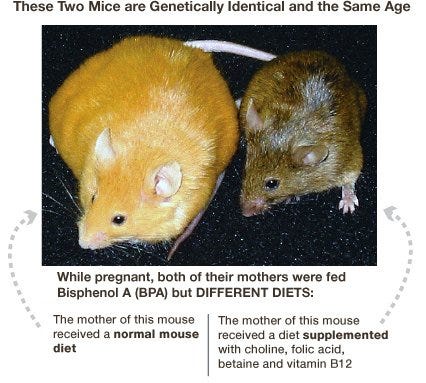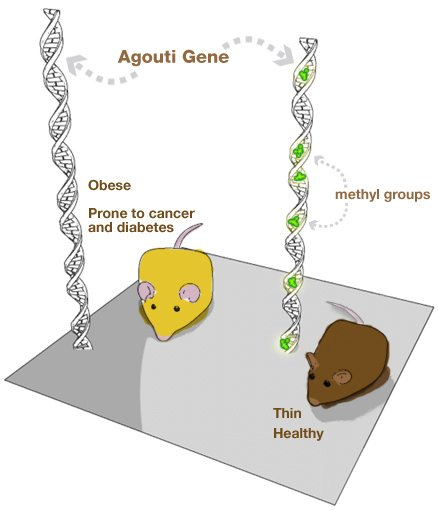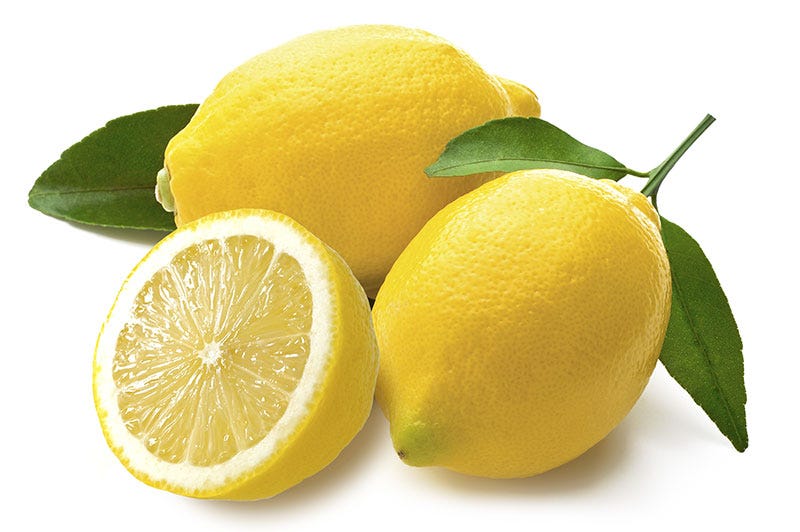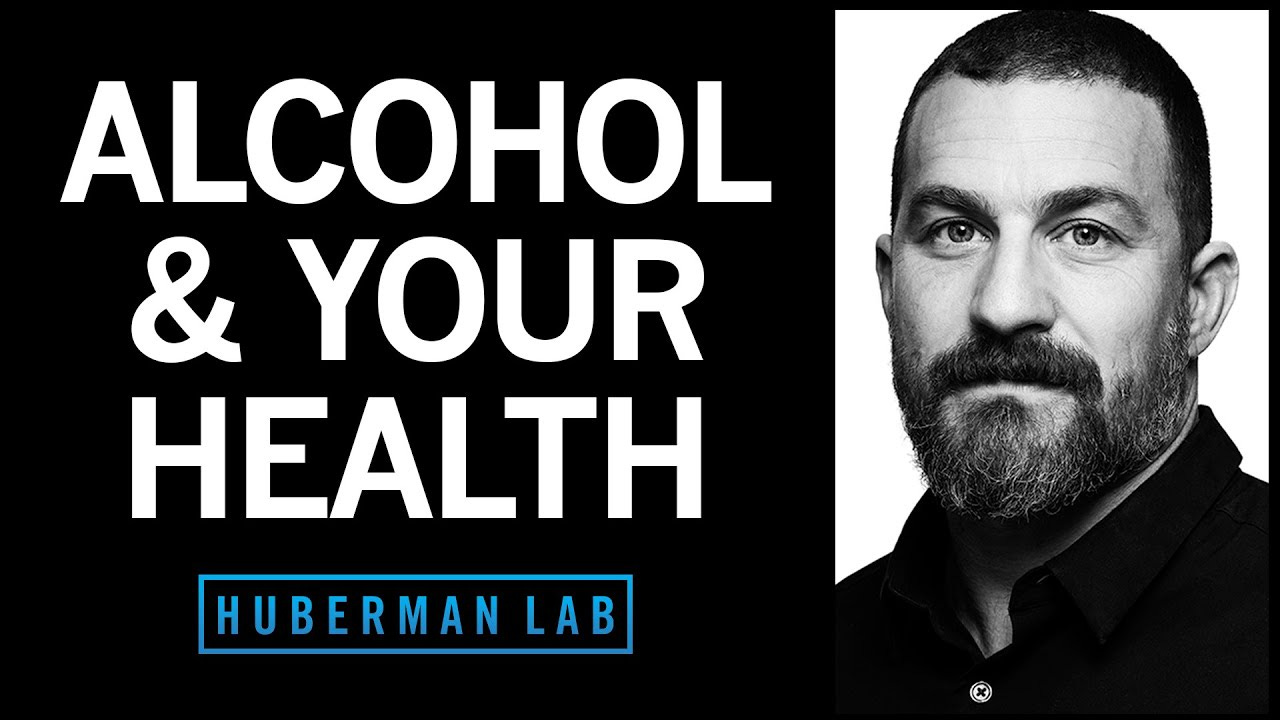Gene-ius Change: The Epigenetics Edition
Taking control of your health, genetics, and longevity.
Weekly exploration of science, technology, and philosophy, threading together actionable insights on health, happiness, and human connection for a more fulfilling life.
Think of life as a complex quilt, and epigenetics is like the seamstress, deciding not only the colors and designs passed down through our DNA but also how our daily habits and surroundings thread influence into our genetic narrative.
Epigenetics, in the simplest terms, is the study of how your behaviors and environment can cause changes that affect how your genes work. Unlike genetic changes, epigenetic changes don't alter your DNA sequence, but they can change how your body reads a DNA sequence. You can think of it as a light switch that can turn genes on or off and determine whether specific genes are actively expressed or silenced. These changes can be influenced by factors like diet, stress, exposure to pollution, exercise, and relationships, amongst many other things.
Today we are going to demystify this concept to help you understand the way your biology, your genes, your environment, your lifestyle, your social interactions, and everything you are experiencing throughout your life impact how your genes work and as a result impact your health, happiness, and human connections.
Today's Flow:
Foundations of Epigenetics
Fundamentals
Research
Quick exercise
Applications
10 Changes & Benefits
Conscious Trade-offs
Future Developments & Considerations
Conclusion
So let's jump right in.
Foundations of Epigenetics
"Genetic factors could explain only a fraction (20 to 30%) of the differences observed in life spans of monozygotic twins, the majority of the remainder of variation [70-80%] is thought to have arisen through epigenetic drift during their lifetime"
- Sangita Pal and Jessica K. Tyler in "Epigenetics and aging" [1] This research by Sangita Pal and Jessica K. Tyler highlights the significant role of epigenetic changes, as opposed to genetic factors, in influencing identical twins' health and life span, suggesting that lifestyle and environmental factors have a massive role in aging. It highlights the concept of "epigenetic drift," where identical genetic material can lead to different outcomes based on changes that affect gene expression over time.
The fact that up to 80% of how one looks, acts, and feels is up to the choices they make, in my eyes, is empowering and enlightening.
This part of today's exploration will lean more academic, but I will do my best not to delve too deep into the weeds of the studies and conclusions. I do believe it is important to lay the groundwork before providing changes that I have made personally and discussing areas for people to explore in their own lives.
Epigenetics is the story of how your environment and lifestyle choices can leave marks on your DNA, kind of like leaving sticky notes on a cookbook telling your body which recipes to use or ignore. This story began back in the early 20th century when scientists started noticing that there's more to inheritance than just the DNA sequence. They saw that something outside of the DNA sequence could influence how genes are turned on or off.
In the 1940s and 50s, researcher Conrad Waddington coined "epigenetics" to describe this idea. His first research study published on the topic was ‘The genetic assimilation of the bithorax phenotype,’ published in Evolution in 1956. [2]
Fast forward to the late 20th and early 21st centuries, scientists began to uncover the mechanisms behind epigenetics, such as DNA methylation and histone modification, kind of like discovering the grammar rules that decide how the DNA's instructions are read.
My favorite way to think about this is using the example of a computer. Think of genetics as the hardware of a computer, the physical components that make up your DNA, like the hard drive storing all your files and programs. Epigenetics, on the other hand, is like the software, programs, and applications that tell the hardware what to do. While the hardware (genetics) sets the foundation and capabilities of the computer, the software (epigenetics) can modify how these capabilities are used, without changing the hardware itself. Just like updating your software can change how your computer operates, environmental factors and lifestyle choices can modify epigenetic markers, influencing how genes are expressed or silenced, thus affecting your health and traits without altering the DNA sequence itself.
These discoveries showed us that our genes aren't just set in stone from birth. They can be influenced by factors like diet, stress, and even our mother's environment before we were born. It's a field that blurs the line between nature and nurture, showing us that our life experiences can directly impact our genetic blueprint and potentially be passed on to future generations.
So, let's look at a study.
Randy Jirtle Agouti Mouse example:
One of the most famous studies used to explain epigenetics is the 2003 study using agouti mice by biologist Randy Jirtle (fellow Wisconsinite-whoop whoop). This study ultimately became so popular and respected that in this line of research, he was honored in 2006 with the Distinguished Achievement Award from the College of Engineering at the University of Wisconsin-Madison (Go Badgers!). Then, in 2007, Jirtle was also nominated for Time Magazine’s “Person of the Year.” [3]
In this study, Jirtle and his team worked with agouti mice, which are genetically predisposed to being fat, yellow in color, and prone to cancer and diabetes. However, when pregnant agouti mice were fed a diet rich in methyl donors (like folic acid, vitamin B12, choline, and betaine), substances that can add chemical tags called methyl groups to DNA, the offspring were significantly healthier. They were born with a brown coat instead of yellow, were leaner, and did not show the same predisposition to diseases as their untreated counterparts.
This study illustrated that the diet of the pregnant mice could alter the epigenetic marks on the DNA of their offspring, specifically affecting the agouti gene responsible for coat color, weight, and health risk without changing the DNA sequence itself.
The nutrients in the diet added methyl groups to the DNA, which silenced the expression of the agouti gene, leading to the healthier physical appearance of the offspring. This research highlighted and validated the impact of environmental factors, like diet, on genetic expression and the potential for epigenetic changes to be reversible or preventable, which has significant implications for understanding the role of genetics and environment in health and disease.
Infographic from: https://learn.genetics.utah.edu/content/epigenetics/nutrition
Now it is important for me to acknowledge that we are in fact not agouti mice, and that humans are much more complex creatures. But, over the last two decades since this research was published, there has been a significant amount of positive research exploring DNA Methylation's ability to show similar effects on humans.
Some studies to dig into if you are curious:
"A comprehensive methylome map of lineage commitment from hematopoietic progenitors" - Hong Ji (2010) [4]
https://www.ncbi.nlm.nih.gov/pmc/articles/PMC2956609/
In very simple terms, Your body has a type of stem cell that can turn into any kind of blood cell it needs, whether it's a type that fights infection (like lymphoid cells) or a type that carries oxygen (like myeloid cells). All these different blood cells come from the same starting point, but as they mature, they specialize or "differentiate" into specific types based on your body's needs.
"Multi-omic underpinnings of epigenetic aging and human longevity" - Lucas A. Mavromatis (2023) [5]
https://www.nature.com/articles/s41467-023-37729-w
a. This study uses methods to link specific genes and biological markers to aging, offering targets for potential to improve healthspan and longevity, which could revolutionize how we approach aging and age-related diseases.
" DNA methylation-based biomarkers and the epigenetic clock theory of ageing" by Steve Horvath & Kenneth Raj [6]
https://www.nature.com/articles/s41576-018-0004-3
Here, the researchers highlight the role of epigenetic changes in aging and suggest that DNA methylation patterns could be used to develop interventions to promote healthy aging.
Overall, these studies and others like them are helping to unravel the complex ways in which epigenetic factors influence gene function, health, and disease. It has been discovered that even in adults, we have significant control over our experiences that change how our genes are expressed.
Why should you care?
This research shows that YOU have the power to modify your genes and reverse disease, and even reverse biological age, no matter how old you are.
I believe this research on epigenetics and methylation, if done right, will change the entire healthcare system over time.
Quick Exercise
Ok, now I want to do an exercise to show how powerful your thoughts can be on the encoding of your genes and biology.
Picture this: A big, fresh Mediterranean lemon. The ripest, juiciest lemon you have ever seen. You can smell the citrus. After smelling the lemon you take a big bite of the lemon.
Give it a second and let that feel of the lemon really set in. You can taste the citrusy burst of lemon on your tongue.
.
.
.
Now notice: What is happening in your mouth? You are likely producing significant amounts of saliva--without a real lemon.
This example provides a simplified illustration of how thoughts and sensory perceptions can trigger physiological responses, like salivation, even without a physical stimulus. This demonstrates the brain's powerful ability to influence bodily functions based on perception, which is related to the concept of epigenetics in that it shows how non-genetic factors (in this case, sensory thoughts) can lead to biological changes. However, I will note that I like this example because it is quick and tangible. Still, more complex epigenetic changes typically refer to modifications that affect gene expression over a longer term and can be passed down through cell division.
Applications
Now that we have set the framework for why epigenetics is so important, we can dig more into the personal side of it.
I often tell my friends that I plan to live to be 150, and they look at me like I have three heads.
I plan to be 150 through a variety of ways but it often comes up when friends ask about retirement, financials, and health. I point to the exponential curve of health discoveries and biotech advancements as reasons I think this is plausible, but I really lean into through my lifestyle and personal development
I want to take the next few minutes to break down a few changes I have made in my life, and that I think can be good changes for people to consider to improve healthspan and genetic expression. The goal of this is to show how little changes in understanding your external variables can make you operate more optimally, live healthier, and be happier.
10 Changes & Benefits
1. Morning Light Exposure
My morning routine is very important to me as I believe in setting a framework for my day that allows me to be able to operate optimally and successfully. One of the important factors for this is ensuring that I wake up and feel energized—ready to accomplish the day. So the first thing I do when I get up is get out of my bed and turn on the lights in my kitchen or open my curtains.
Exposure to morning light can have several beneficial effects on my body, which can be linked to epigenetic changes. Light, especially natural light in the morning (which is difficult in the dark London winters), helps to regulate our circadian rhythms, which are the physical, mental, and behavioral changes that follow a 24-hour cycle. These rhythms affect sleep, hormone levels, and even gene expression. By influencing the body's internal clock, morning light can cause epigenetic modifications that optimize gene expression patterns, improving metabolic functions, mood regulation, and overall well-being.
These benefits have been widely popularized by Andrew Huberman (Neuroscientist at Standford) in his podcast Huberman Labs, and can be a transformative first step in one’s health journey.
2. Gratitude Exercise
I start each day with my gratitude journal or a moment of gratitude while traveling. During this practice I set an intention for the day and look for 3-5 reasons to be grateful.
This has been one of the most psychologically beneficial changes that I made, which started back when I worked in the Buying Offices at Macy's Inc. in New York City in 2018. I used to have everyone in the cubicles around me also tell me five things they were grateful for as, at the time, I felt like I could feel a shift in energy in the room when we all started with that practice.But event after I left, I received texts from my coworkers saying they were still doing the practice up to 2 years later and it made me smile (and also solidified that these practices work for other people as well!).
When you focus on positive thoughts, like gratitude, your body can reduce the production of stress hormones like cortisol. Lower levels of stress hormones can lead to a healthier physical state because chronic stress can cause epigenetic changes shown to negatively affect health and immune system.
The act of expressing gratitude has also been shown to increase the production of feel-good neurotransmitters like serotonin and dopamine, which can have a positive effect on mood and stress response at an epigenetic level over time.
The five minute journal is a really great resource to start this type of practice.
3. Walk & Train
I exercise every morning whether it be a proper gym session or a bit of a walk to get my body moving even on my rest days. I intentionally go to a gym that is 2 miles from my flat in London so that I can get my daily steps in and create space to wake up, get my brain active, and get fresh air before I arrive.
Walking can alter the expression of genes involved in inflammation, immune response, and metabolic processes by changing the methylation patterns of DNA. Meaning that a simple morning walk ( a good benchmark is 20 minutes) can help reduce inflammation, enhance immune function, and improve metabolism, which are associated with a lower risk of chronic diseases, better mental health, and overall longevity.
It is an easy way (for most people) to get started with recognizing how your choices can improve your mental and physical health. The suggested amount, as we have all heard, is 10,000 steps per day (I have averaged 17,100 a day for the past year as 15,000-20,000 is my sweet spot), but even going from 3,000 (which is the average amount of steps for a US adult according to Mayo Cinic [6]) to 6,000 has shown to reduce individual risk for heart disease, obesity, iabetes, high blood pressure, and depression.
So go on, get that hot girl walk in—it’s good for you.
4. Sleep Regulation
I am very intentional about creating a space for my sleep, as research has shown how integral it is for cognitive function and performance.
I do not sleep with my phone or a TV in my bedroom for multiple reasons. One of them is the temptation to engage with these things in a space that I have designated for my rest. But more importantly, having no screens in my bedroom benefits me biologically by promoting better sleep quality.
Screens emit blue light, which can suppress melatonin production, the hormone that regulates sleep-wake cycles. Melatonin is produced by the pineal gland in the brain when it gets dark, signaling to your body that it's time to sleep. Exposure to blue light at night from screens can trick your brain into thinking it's still daytime, thus reducing melatonin levels and making it harder to fall asleep or stay asleep (this is even worse if you check your phone when you wake up in the middle of the night!)
5. Conscious Consumption
I became vegan almost 3 years ago now. Everyone always asks me if it was for the animals, to reduce my carbon footprint, or for health reasons. These all played somewhat of a role in it, (and at the time my good friend Jack was also trying it out and had influenced me to give it a go). But ultimately, the primary reason I stuck with it was the intentionality it forced me to have around my consumption patterns.
Whenever I picked up a new food or ordered something at a restaurant, I started paying attention to the nutrition labels. This at first was to check for animal products, but then quick became an exercise to understand the nutritional make-up of the food. I started reducing my consumption of saturated fats, sugars, sodium, and preservatives simply by being more intentional about what I was picking up.
It also allowed me to ensure I was hitting my protein goals, consuming the right amount of good fat, and understanding my carb consumption as it pertained to my fitness goals and cognitive performance.
6. No Alcohol
As I know this change is probably one of the harder ones for people to comprehend (although society is trending in a good direction - props to Gen Z!), I will keep this straight to the point.
Alcohol consumption can significantly affect mood regulation, as it acts as a depressant on the central nervous system. Initially, it may stimulate neurotransmitter release that enhances mood, but chronic consumption leads to a reduction in these neurotransmitters, which can result in mood disorders. Additionally, alcohol can increase the body's production of cortisol, a stress hormone, which over time can impair the body's ability to regulate stress and anxiety effectively.
Persistently high cortisol levels due to regular alcohol intake can lead to various health issues, including immune dysfunction, increased abdominal fat, and cardiovascular disease. Additionally, mood disturbances may contribute to behaviors that further compromise health and shorten lifespan.
Andrew Huberman has also popularized this. Huberman's podcast episode on alcohol “What Alcohol Does to Your Body, Brain & Health” was the most shared podcast in 2023 (I was probably 50% of the sends). If you want a further deep dive into the effects of alcohol, I recommend listening to this podcast, and I will also do a Connective Threads piece on this topic and my experience with it in the future.
Link to the podcast here
7. Supplementation Stack
I use many supplements to ensure I can get the proper nutrients to maintain healthy brain function and gut health. I want to extrapolate on three that I take for more specified reasons, then I will list the rest. Some of these are all still very new to the market and are undergoing further studies, but I find them to help for the reasons listed below.
Lions Mane for Cognitive Function
Lion's Mane mushroom contains compounds that stimulate the growth of brain cells. Studies suggest these effects could be beneficial for improving cognitive function, especially in individuals with mild cognitive impairment or Alzheimer's disease. However, it is generally believed that more research is still needed to fully understand how Lion's Mane can support brain health in humans more holistically.
Magnesium L-Threonate for Sleep (1 hour before sleep)
Magnesium levels play an important role in the brain in supporting deep, restorative sleep by maintaining healthy levels of GABA, a neurotransmitter that promotes sleep. Adequate magnesium levels can help improve sleep quality, and Magnesium L-Threonate is often chosen for its ability to better penetrate the brain barrier for a more effective increase in brain magnesium levels.
Creatine Monohydrate for Muscle Repair
Creatine monohydrate helps with muscle repair by providing extra support in ATP, the main energy source for muscle contractions, which is important during high-intensity exercises (I always take a little extra before Barry's Bootcamp). This extra energy aids in longer and more intense training sessions, which is beneficial for both muscle growth and repair. Additionally, creatine can draw water into muscle cells, aiding in muscle repair and growth.
A list of all my other daily supplements:
Electrolyte & Hydration Tablet with 24oz of water
Vitamin A - 1 tablet
Vitamin B complex - 1 tablet
Vitamin C - 2g
Vitamin D - 250mg
Omega 3 - 2g
Ashwagandha - 500mg
Organic Sea Moss - 1 capsule (soon to be removed)
Finasteride - 2.5mg
Minoxidil - 2.5mg
15g Amino Acids
Ginkgo Biloba - 600mg
8. Community Building
Humans are pack animals. We have always moved in groups, depended on each other, and lifted each other up since the dawn of our time on this planet. It is no surprise that our brains are wired to derive extreme benefits from deep and meaningful relationships.
Good human relationships are also fundamental to mental and physical health. They offer emotional support, which can reduce stress, anxiety, and depression. Social connections also encourage healthier lifestyle choices and can enhance immune function. Moreover, strong relationships contribute to a sense of belonging and purpose, which have played a major role in longevity research.
Over the past few years, I have been fortunate enough to work an incredible job that I find very rewarding by building communities (6,000 members and founders strong!). Still, I have also made an equal effort to create space for the people in my personal life for time with my loved ones and friends. I have highly prioritzied creating spaces for people outside of partying to have genuine and thoughtful conversation. Some of these spaces include themed dinners and a regular reflection group that we call “Full Moon Mindfullness”, where we get together to check in on goals, challenges, and overall well being every full moon to support one another.
*Picture of a Gaingels event in Los Angeles
9. Petting Dogs
I will always try to stop and pet dogs in a park when I am on a walk.
We've seen studies show a significant release of oxytocin, serotonin, and dopamine when petting dogs. These chemicals are associated with pleasure and bonding and can help to lower stress levels. Physical contact can also reduce levels of cortisol, the stress hormone, and lower blood pressure, leading to a more relaxed and calm state.
It is shown to do the same for the dog as well.
Enough said. Pet more dogs.
10. Breathwork Practice
The last change that I want to touch on is breathwork. This was a relatively new concept to me which I found two years ago as I was really digging into niche areas of my life that I could improve. Needless to say I have found breathwork engaging in transformative for a few reasons.
Breathwork works for me in the place of what most people use as meditation. It aims to bring awareness and control to the breathing process, which can calm the mind and reduce stress. While meditation often involves observing thoughts and sensations, breathwork actively uses breathing techniques to influence mental, emotional, and physical states. It's a more accessible practice for those who may find traditional meditation challenging. Although I find breathwork to be a good practice for me right now, I am also still working on being better at meditating in the meantime.
Lastly, breathwork is the only out of body experience that I have ever had (Needless to say for most people, but for those who do not know me well, I do not do drugs). Studies have shown that breathwork can stimulate similar effects to psychedelics in that it can induce altered states of consciousness, intense emotional release, and sometimes even visual hallucinations. This is due to the impact that controlled breathing can have on the nervous system and brain chemistry, affecting the balance of oxygen and carbon dioxide in the body, which can lead to changes in perception.
When I had my first out-of-body experience, it felt like a confirmation of the road that I am on in life and my desire to bring people together to share experiences to generate opportunities to become better versions of ourselves. I have only had the out-of-body experience once, but I find the practice extremely grounding and helps me stay in homeostasis and aligned with my mission.
Trade-Offs
There are still many areas that I am looking to improve in my life, including access to regular nature, caffeine consumption, and exposure to pollution that I believe, among other things, could improve the epigenetic influence on my longevity.
I will highlight one to show how I think of these trade-offs for the time being.
Pollution:
I live in London, a large urban city that has a lot of pollution. I am aware that this pollution has the potential to lead to health problems, such as an increased risk of chronic diseases, including respiratory conditions, cardiovascular diseases, and even cancer. Even more short term affects like reduced cognitive function in areas with increase C02 parts per million. However, I believe that the benefits of having a community around me, mental stimulation from local events, and my ability to correct for this exposure through air purifiers and time spent out of London is actually a net positive for me to live in the environment that I do.
I will take regular inventory of things I know that are not good for me, and think of ways in which I can correct for it or balance it out with other areas in my life.
Future Development & Consideration
The MRI, our first non-invasive ability to scan brain activity, was only invented in the 1970s. For me, this highlights the infancy stage that we are currently in with understanding just how our brains truly work. We see new tools coming to fruition quite often now that help us understand ourselves and how our biology works.
I believe in the coming years, we will see a much broader adoption of tools, experiences, and achievement orientation that will be leveraged to optimize the human experience and our time here on Earth.
A few things I have my eyes on in the near future:
1. Psychedelics
I have never done psychedelics, but I have seen the research and heard first-hand stories of how transformative this tool can be for individuals. The popular book "How to change your mind" by Michael Pollen, which has since been made into a Netflix series (which I have not seen but plan to watch one day), amongst other research has created a lot of space for the discussion in business and for the greater good of society.
The use of these tools (psilocybin being the most prevalent at the moment) is being researched for their potential therapeutic effects, including their ability to bring about lasting changes in mental state and cognitive function.
From an epigenetic standpoint, these substances may affect gene expression related to neural plasticity (I will have a whole piece on this in the future), mood regulation, and stress response. While the exact impacts are still being studied, it's hypothesized that psychedelics could induce beneficial changes that help in the treatment of conditions like PTSD, depression, and anxiety, potentially leading to improved mental health outcomes on a societal level. However, I personally believe these substances should always be used within a legal, safe, and clinically supervised context. Still, I am bullish on this topic, given the research and experiences of people near and dear to me.
In full transparency, as that is my goal for Connective Threads, I do plan to try psilocybin in the near future. I would like to go where it is legal at some point in the coming year, find someone who I trust to guide the experience, and go in with the intention of being open and learning so I can speak first hand to the experience and usage as a tool.
2. Wearables, Biomarkers, & Longevity CPG
An incredible development in the past decade has been wearable technology. It has given humans an insight into regular biomarkers to understand what is really going on with our bodies. I personally engage with my Apple Watch and Eight Sleep Bed to track my expenditure and recovery, but I have my eye on many products and practices coming down the pipeline.
Zoe - Gut Health Optimization
Oura Ring - Expenditure and Recovery (looking to replace my Apple watch)
InsideTracker - Blood Biomarker Tracking
Jung+ - Longevity CPG
Apple Vision Pro - Apple’s new spatial computing device (I’m interested in seeing the opportunity to treat mental illness through immersive experiences here)
All very interesting areas of development that are ripe for expansion or disruption, and I am keen to watch navigate the change over the next 12 months.
3. Love & Life Fulfilment
Pivoting away from tools to focus on why I care about all of this, I ultimately want to achieve my goals and desires for the life I want to live on this planet.
A big focus for me in the near future is making space for romantic relationships. Although I clearly love the idea of being healthy and living a long time for myself, it is very much so done through a lens of services for the things and people that I love.
This year I turned 28, and one of the things on my radar is my desire to have kids in the coming years. One of the most fulfilling things for me is helping people learn and grow. A big reason I put an emphasis on wellness and epigenetics is so I can show up as a better person for the people around me (reminder from the introduction that my life motto is “Be the person you needed when you were younger”).
Ultimately, I think these traits and experiences are setting me up to be a great dad, and I am really looking forward to the day that I get to put that into practice.
For now, I am excited to find a partner when the time is right, learn and grow together in a consistent and healthy way, and start the journey down that path when the time is right.
Conclusion
The last five years of my life have been a phase of finding homeostasis. I focused a lot on understanding what it meant to be me (the next Connective Threads is on "Sense of Self"). To be the most authentic version of myself, I peeled away nearly all inhibiting substances, built a great foundation of epigenetically beneficial practices, and established a clear mind to start exploring what is possible in my future.
This opportunity with understanding the influence of epigentics at its core is an opportunity to become extremely empowered in our daily lives. You no longer have to think "Oh my god I am going to get heart disease, I am going to get cancer, I am going to get diabetes" simply because your family has a history for these diseases. It is on you to change your lifestyle, break generations of bad habits, or continue good habits your parents or caregivers may have taught you.
The single biggest risk factor for every disease is age. As we saw today, there increasing evidence that we can not only stop but reverse our biological age through conscious lifestyle improvements.
Up to 80% of the way you show up in this world is up to you, so what are you going to do to become a better version of yourself and achieve your dreams?
Sources:
[1] https://www.ncbi.nlm.nih.gov/pmc/articles/PMC4966880/
[3] https://www.drkarafitzgerald.com/2018/04/12/epigenetics-the-agouti-mice-study-with-dr-randy-jirtle/
[4] https://www.ncbi.nlm.nih.gov/pmc/articles/PMC2956609/























